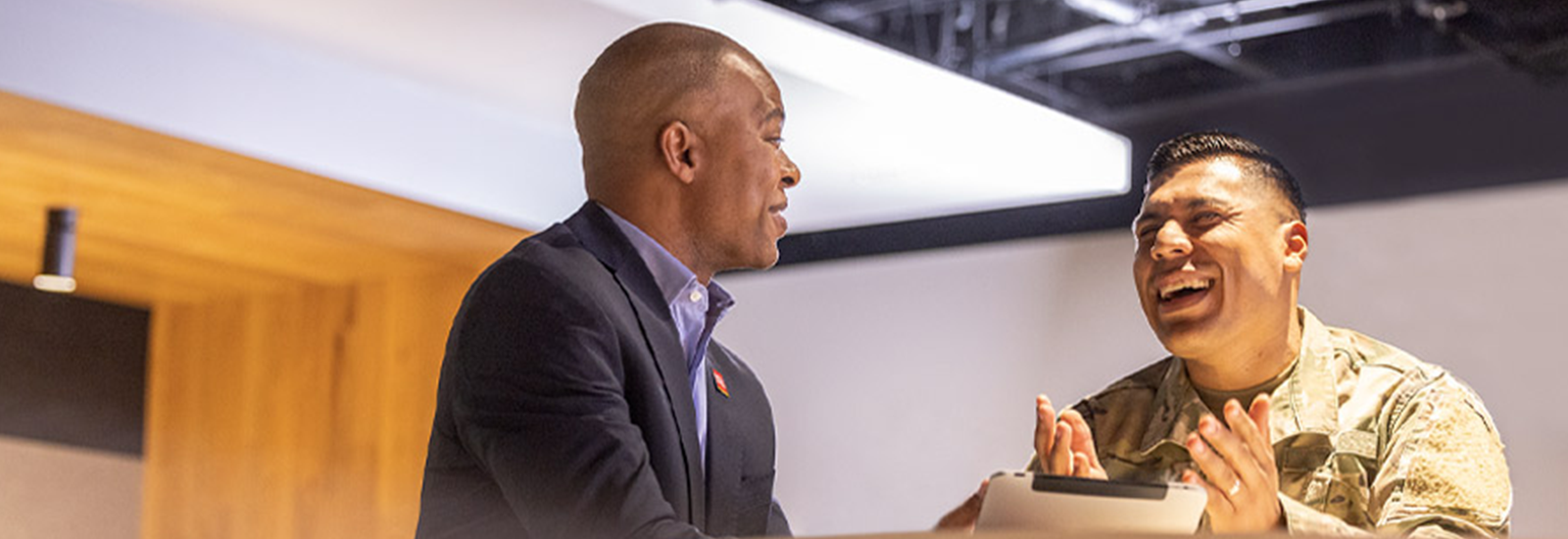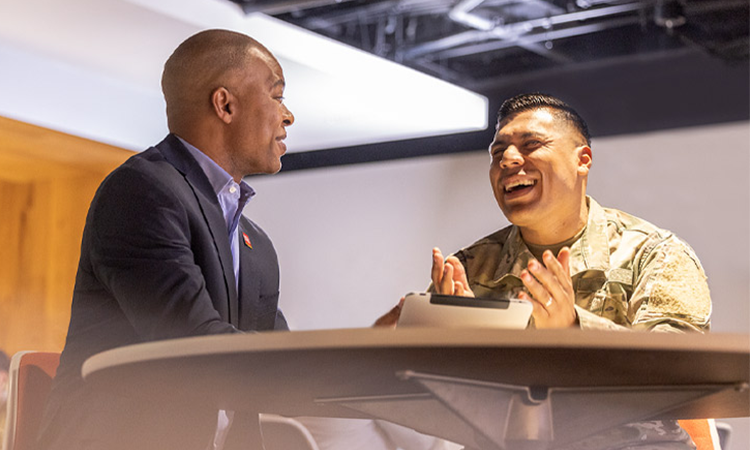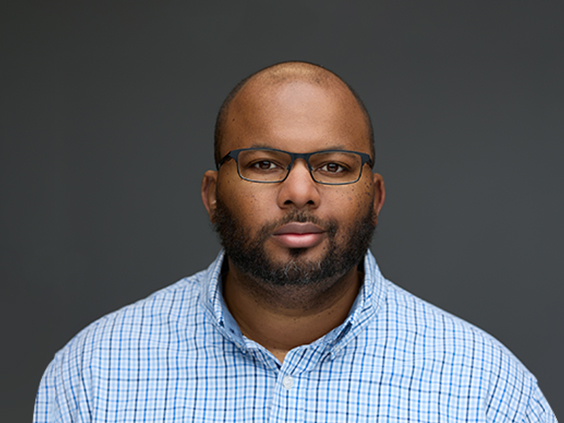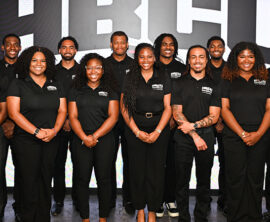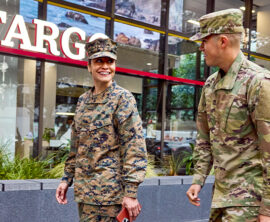At 20, operating Marine convoys through Iraq, corporate America was the furthest thing from Brian Armstrong’s mind. Today, wiser and older, Armstrong realizes his time abroad and while in service — the safe transport of millions worth of equipment, machinery, or security all while leveraging small unit leadership for the well-being of fellow Marines — was the launching pad for his post-military career.
His specific roles — and many others in the military — required a wide-ranging skillset often developed in a service member’s early years. Being able to transfer those abilities to corporations and everyday business is one of the reasons veterans are in high demand.
[Video overview: Victor Perez, Lead Investment Banker at Wells Fargo and U.S. Navy Veteran; Giselle Valdez, Wells Fargo Lead Commercial Banking Relationship Manager and U.S. Marine Corps Veteran; Ruth Jacks, Head of Diverse Segments for Commercial Banking at Wells Fargo and U.S. Army Veteran; Ann Peterson, Human Resources Executive at Wells Fargo and U.S. Army Veteran; and Remy Timbillah, Lead Corporate Banking Relationship Manager and U.S. Army Veteran share their thoughts on the value that veterans bring to the workforce.]
[Music]
[Victor Perez, Lead Investment Banker at Wells Fargo, U.S. Navy Veteran]
I think being a veteran is central to who I am. I mean, it’s the, the integrity. It’s the, the grit, the the drive, the, ‘Hey, that’s not right. Let’s fix it.’
[On-screen text]
Approximately 150,000 to 200,000 service members transition to civilian life each year, according to the Department of Defense.
[Giselle Valdez, Wells Fargo Lead Commercial Banking Relationship Manager. U.S. Marine Corps Veteran]
I’m a woman, I’m a Latina. I’m proud of both. They definitely define who I am, but I earned being a veteran, which means you have served the country. And, it’s something that I believe Wells Fargo does acknowledge.
[On-screen text]
4% of all U.S.-based employees have self-identified as a veteran, and in 2023 we hired more than 1,100 veterans externally.
[Ruth Jacks, Head of Diverse Segments for Commercial Banking at Wells Fargo, U.S. Army Veteran]
Wells Fargo has made a commitment to caring for veterans. Every day we hire veterans. Every day we develop veterans. Every day we’re looking for ways to promote veterans. And, we understand that there are skills that you learn in the service that don’t compare to anything that you see.
[On-screen text]
The dedicated Military Talent Strategic Sourcing team helps veterans explore careers at Wells Fargo.
[Valdez]
Being proactive to get the job done, being committed to a specific mission, being focused on teamwork and looking out for one another to create a good working environment, these are all things that veterans just automatically have to offer.
[On-screen text]
Wells Fargo employs veterans in all of our business groups and enterprise functions across hundreds of different jobs.
[Ann Peterson, Human Resources Executive at Wells Fargo, U.S. Army Veteran]
I’ve seen people come out of the military and if you ask a military member, you know, ‘What can you do?,’ they’ve done everything. They’ve run everything from running a Navy ship to being out in combat to, you work in HR, you supply, logistics.
[On-screen text]
The Veterans’ Connection Employee Resource Network has more than 10,500 veteran and non-veteran members.
[Remy Timbillah, Lead Corporate Banking Relationship Manager, U.S. Army Veteran]
I was part of a quick reaction force unit, so it means you have to react and adapt very quickly and lives were at stake. And, here I realized that even though that threat is not physical, coming back to your client and saying, ‘Hey, how do we adapt? How do we relate to this? How do we keep operating and take care of our end customers?’
[On-screen text]
Any given day, Wells Fargo has approximately 200 employees on military leave, serving in uniform.
[Jacks]
There are an awful lot of skills that soldiers have that are transferable into corporate America. And, it takes soldiers and veterans to understand that and to help our HR and our recruiting team recognize that so we can hire more veterans. It’s a great place to work when it comes to veterans.
[On-screen text]
© 2024 Wells Fargo Bank, N.A. All rights reserved.
Military veterans employed at Wells Fargo share their thoughts on the value that veterans bring to the workforce. (2:01)
Veterans are valued at Wells Fargo, not just for their exemplary service, but because of their ability to thrive in differing environments and circumstances.
“In the military, you learn to quickly think on your feet and as leaders make precise decisions that impact mission or team,” said Armstrong, head of Military Recruitment for Wells Fargo. “We (veterans) span the breadth of the United States, and we can leverage our unique, diverse perspectives to react and deliver under pressure. Add this to the soft skills we gain during service, and I think veterans are an extremely attractive demographic for employers.”
In his current role, Armstrong leads a team of 12 focused on sourcing military talent. He leverages the same leadership and team-building concepts from his time in the Marine Corps to set up the team up for success.
“Nothing great gets done without a high-performing team, those that are standing on my left and right,” Armstrong said. “To accomplish any mission, you must take care of your team. As leaders, we create the environment that allows our team to learn, thrive, and want to return tomorrow. I strive for that personally with my own team, and I know Wells Fargo has done that for veterans.”
Finding the transferable skills
For the last eight years, Chris Pink, cohead of the Structured Products Group, has been a mentor to veterans through Wells Fargo’s collaboration with American Corporate Partners. ACP offers a free mentoring program that connects post-9/11 service members with corporate professionals.
The seven mentees he’s had, along with the one he’s working with now, have confirmed his evaluation as to why companies support veterans.
“I am not a veteran so I can’t speak from my own experience, but through my mentoring relationships I have seen a recurring theme whereby service members that leave the military also feel they are losing their identity,” Pink said. “My job as a mentor is to help them see that the identity doesn’t have to go away, it just needs to shift to a new arena.”
In Pink’s experience, many veterans have been serving in roles analogous to high-level corporate jobs throughout their service.
“They come to us with a set of skills that are difficult to teach: leadership, stamina, working in a team, communicating, working under pressure, executing on time.”
During hourlong sessions with mentees, Pink probes through mentees’ experiences and skills to see how they’re transferable into a corporate environment.”
“I’m peppering them questions about ‘What does this mean?’” said Pink. “‘What were your day-to-day responsibilities in this role?’ After a while, it becomes clear, and we can work out what they really did in a form that civilian employers can understand.”
Pink shared an example of a former mentee who now works at Wells Fargo, who was a part of the United States Air Force’s space program for decades.
“He managed satellites and trained people in the region how to function with the satellites turned off in case of failure,” Pink said. “It became clear pretty shortly that my mentee had been managing risk his entire career. So we were able to tell him, ‘This is where we think you’d really excel, because you’ve already mastered in one channel, now you just have to apply the same skillset to another.”
Moving forward, Pink hopes Wells Fargo and ACP continue to push the envelope when it comes to supporting, mentoring, and hiring veterans.
“The program may stop with a (mentee) after a year, but the relationship doesn’t,” he said. “I’ve learned so much from these veterans and I look forward to continuing to do so for many years to come.”
For more than 170 years, Wells Fargo has supported military service members and veterans through foundation donations, financial health resources, and event sponsorship. The company’s bevvy of programming ensures its actions align with its words.
“One thing that makes me proud to be part of Wells Fargo is seeing senior leaders that are very outspoken about not just supporting veterans, but about how we add value the company,” Armstrong said. “It’s not just about hiring military, though. You see the investments back in our communities with home donations, grants, car donations, and even supporting veteran-owned businesses … which helps everyone.”
Wells Fargo is committed to empowering military service members and veterans to effectively navigate life’s transitions to achieve ongoing career and financial success while impacting their community.
Home donations
The Wells Fargo Military Home Donation Program in collaboration with the Military Warriors Support Foundation (MWSF), donates mortgage-free homes to wounded Veterans and Gold Star families through the Homes4Wounded Heroes program. Over the past 10 years, Wells Fargo has donated more than 400 homes valued at over $60 million to support veterans and their families in all 50 states. Wells Fargo and MWSF have impacted 499 adults and 483 children through this program (as of November 2024).
Auto donations
Wells Fargo is proud to have worked with car dealers across the country since 2015 to award more than 120 vehicles and provide family and financial mentoring, valued at more than $4 million, to deserving veterans and Gold Star families through the Military Warriors Support Foundation’s Transportation4Heroes program or to nonprofit organizations directly.
“The very first day we were in business, our personal vehicle was involved in a hit-and-run,” said Benjamin Breckheimer, a veteran and co-owner of a mobile coffee truck who received a vehicle in 2023. “It (the Ford Escape he was awarded) relieves that financial burden of a monthly car payment, so we can help build up our personal saving account to hopefully open up our own brick-and-mortar shop.”
Mentorship
Mentorship and professional development are a high priority for Wells Fargo employees. There are several options available for employees to mentor or be mentored. Employees may utilize our self-directed or formal internal mentorship programs. We also partner with community nonprofit veteran service organizations (VSO) who offer mentorship programs.
American Corporate Partnership’s (ACP) Mentoring Program connects post-9/11 Veterans, Active-Duty Spouses and eligible Military Spouses (Protégés) with corporate professionals (Mentors) for customized mentorships to assist them along their path towards fulfilling, long-term careers. More than 100 Wells Fargo employees have volunteered to mentor community veterans and military spouses. Over 4,600 Veterans and Active-Duty Spouses completed the ACP Mentoring Program in 2024.
Recruiting military talent
Wells Fargo has a dedicated Military Talent Sourcing Team, led by Sean Passmore, the company’s head of Enterprise Military and Veteran Initiatives, designed to help veterans explore the many ways their military experience can be put to work at the company. Talent programs include:
- Veteran Employment Transition (VET) Program
- Julie Scammahorn National Military Apprenticeship Program
- Boots to Banking
- Corporate Fellowship
- Homefront Heroes Military Spouse Hiring
Learn more about Wells Fargo’s commitment to veterans.
